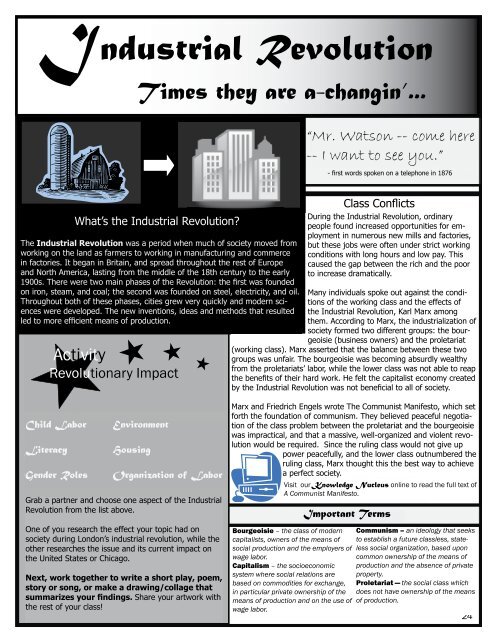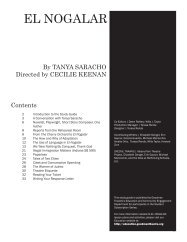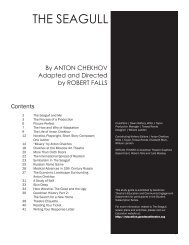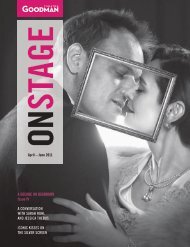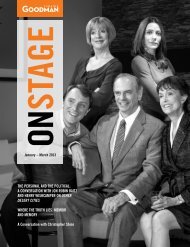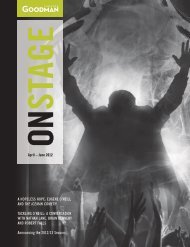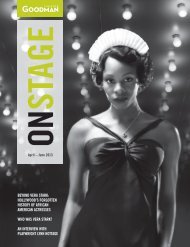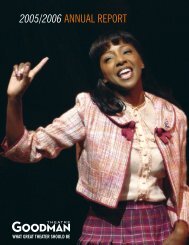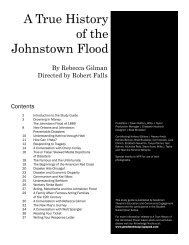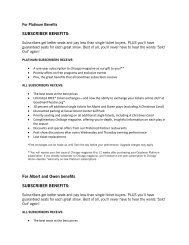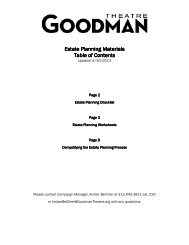A Christmas Carol Study Guide.indd - Goodman Theatre
A Christmas Carol Study Guide.indd - Goodman Theatre
A Christmas Carol Study Guide.indd - Goodman Theatre
Create successful ePaper yourself
Turn your PDF publications into a flip-book with our unique Google optimized e-Paper software.
I<br />
ndustrial Revolution<br />
Times they are a-changin’...<br />
“Mr. Watson -- come here<br />
-- I want to see you.”<br />
- first words spoken on a telephone in 1876<br />
What’s the Industrial Revolution?<br />
The Industrial Revolution was a period when much of society moved from<br />
working on the land as farmers to working in manufacturing and commerce<br />
in factories. It began in Britain, and spread throughout the rest of Europe<br />
and North America, lasting from the middle of the 18th century to the early<br />
1900s. There were two main phases of the Revolution: the first was founded<br />
on iron, steam, and coal; the second was founded on steel, electricity, and oil.<br />
Throughout both of these phases, cities grew very quickly and modern sciences<br />
were developed. The new inventions, ideas and methods that resulted<br />
led to more efficient means of production.<br />
Activity<br />
Revolutionary Impact<br />
Class Conflicts<br />
During the Industrial Revolution, ordinary<br />
people found increased opportunities for employment<br />
in numerous new mills and factories,<br />
but these jobs were often under strict working<br />
conditions with long hours and low pay. This<br />
caused the gap between the rich and the poor<br />
to increase dramatically.<br />
Many individuals spoke out against the conditions<br />
of the working class and the effects of<br />
the Industrial Revolution, Karl Marx among<br />
them. According to Marx, the industrialization of<br />
society formed two different groups: the bourgeoisie<br />
(business owners) and the proletariat<br />
(working class). Marx asserted that the balance between these two<br />
groups was unfair. The bourgeoisie was becoming absurdly wealthy<br />
from the proletariats’ labor, while the lower class was not able to reap<br />
the benefits of their hard work. He felt the capitalist economy created<br />
by the Industrial Revolution was not beneficial to all of society.<br />
Child Labor<br />
Literacy<br />
Gender Roles<br />
Environment<br />
Housing<br />
Organization of Labor<br />
Grab a partner and choose one aspect of the Industrial<br />
Revolution from the list above.<br />
One of you research the effect your topic had on<br />
society during London’s industrial revolution, while the<br />
other researches the issue and its current impact on<br />
the United States or Chicago.<br />
Next, work together to write a short play, poem,<br />
story or song, or make a drawing/collage that<br />
summarizes your findings. Share your artwork with<br />
the rest of your class!<br />
Marx and Friedrich Engels wrote The Communist Manifesto, which set<br />
forth the foundation of communism. They believed peaceful negotiation<br />
of the class problem between the proletariat and the bourgeoisie<br />
was impractical, and that a massive, well-organized and violent revolution<br />
would be required. Since the ruling class would not give up<br />
power peacefully, and the lower class outnumbered the<br />
ruling class, Marx thought this the best way to achieve<br />
a perfect society.<br />
Visit our Knowledge Nucleus online to read the full text of<br />
A Communist Manifesto.<br />
Important Terms<br />
Bourgeoisie – the class of modern<br />
capitalists, owners of the means of<br />
social production and the employers of<br />
wage labor.<br />
Capitalism – the socioeconomic<br />
system where social relations are<br />
based on commodities for exchange,<br />
in particular private ownership of the<br />
means of production and on the use of<br />
wage labor.<br />
Communism – an ideology that seeks<br />
to establish a future classless, stateless<br />
social organization, based upon<br />
common ownership of the means of<br />
production and the absence of private<br />
property.<br />
Proletariat — the social class which<br />
does not have ownership of the means<br />
of production.<br />
24


